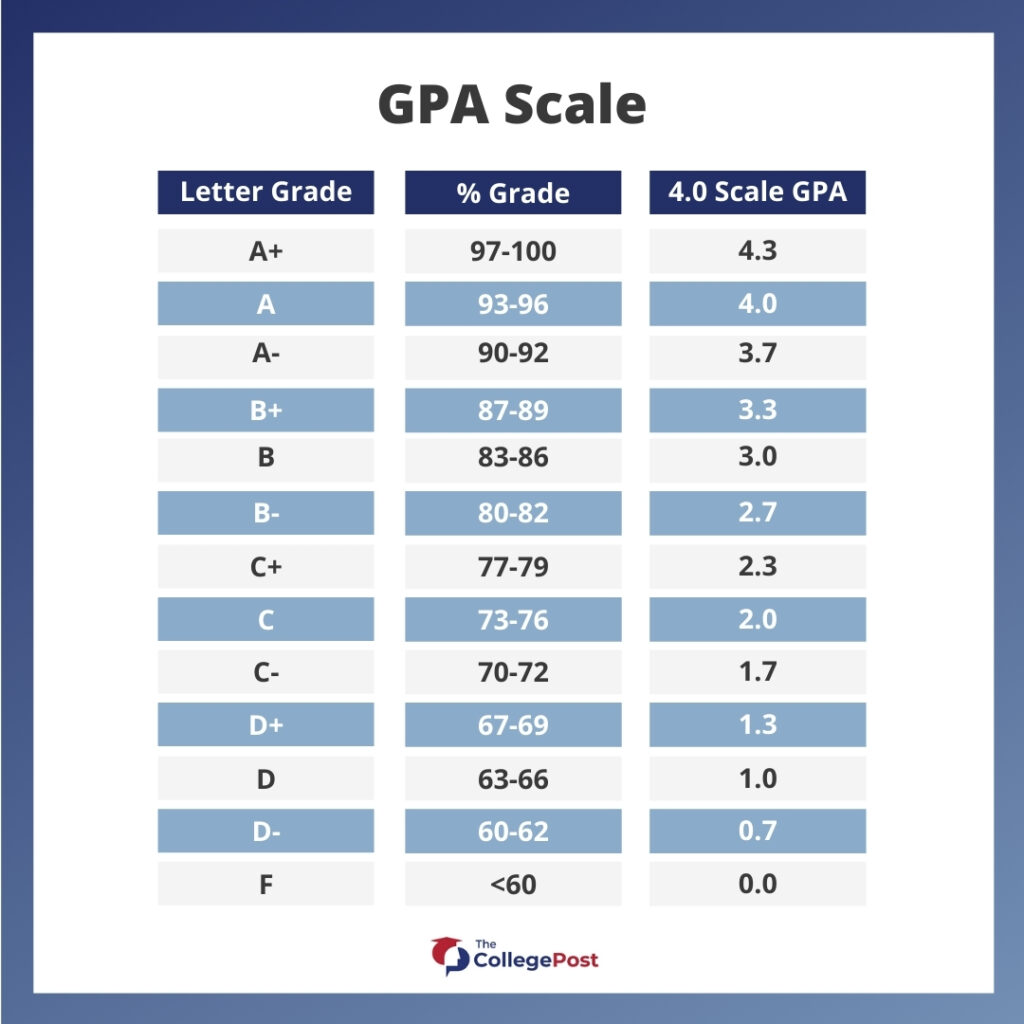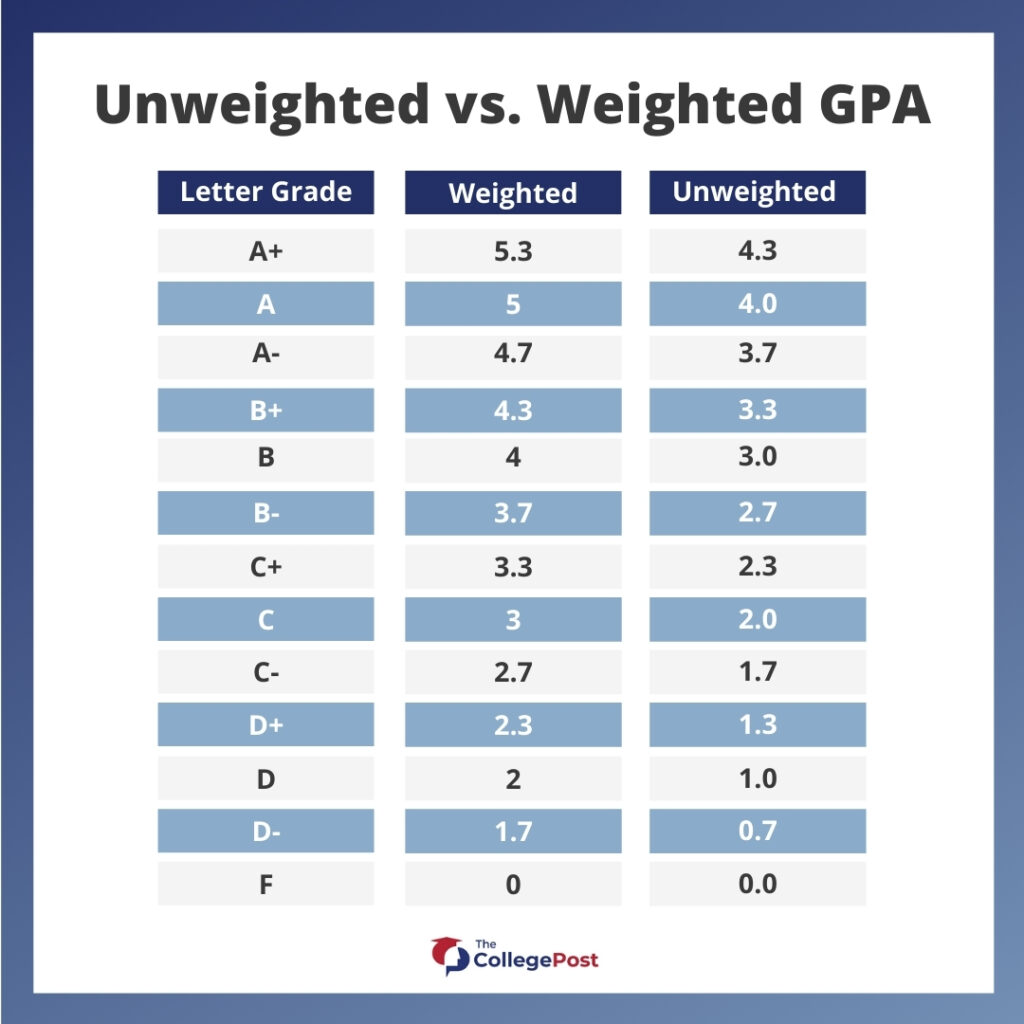When you’re applying for college, one thing is for sure: your grades matter. But if you’re taking AP classes (go you!) you’ll likely have two numbers: your weighted and unweighted GPA. So which GPA will your potential colleges consider?
Knowing and understanding how colleges interpret and use these numbers is crucial to your game plan.
What Is an Unweighted GPA?
An unweighted GPA uses a 4.0 scale — meaning each letter grade corresponds to a numerical value. Getting an “A” means you have a grade of 4.0 while an “F” means you’ve failed the class. Simple, right?
Most high schools and colleges use the unweighted GPA to best reflect a student’s academic performance but it’s not a perfect system.

The main problem with an unweighted GPA is that if you’re taking Advanced Placement (AP) or honors classes, the extra effort and skill of your coursework isn’t reflected in your GPA. A “B” in AP English and a “B” in normal English will equally translate into a 3.0 GPA — even though AP English is more challenging.
What Is a Weighted GPA?
A weighted GPA uses a scale that typically goes higher than 4.0 to allow for difficult classes. This usually means a 0 to 5.0 scale but it can go higher depending on the school.
Students in AP classes that use weighted GPA can expect to receive a 5.0 when they get an “A,” a 4.0 for a grade of “B,” and so on. This method accurately represents a student’s academic proficiency and class rank based on their chosen coursework.
But fair warning, schools often have their own weighted GPA scale, so the above examples are only general estimates.

TIP: You can calculate your weighted and unweighted GPA with an online GPA calculator.
Will Colleges Look at My Unweighted or Weighted GPA?
Here’s the good news: colleges often look at both the student’s unweighted and weighted GPA. Why? These two numbers show admissions teams how well you perform academically — individually and compared to your class — and if you have a challenging course load.
How Your High School Will Report Your GPA to Colleges
Generally speaking, official high school transcripts include both unweighted and weighted GPA, but this can differ between schools.
If you’re curious to know what your desired university will be getting, it’s perfectly fine to request a copy of your transcript and double-check how your GPA was calculated.
Other information you can find in your high school transcript includes:
- All your high school classes in chronological order (fourth-year classes will be listed last)
- Your grades in each class
- Your GPA (unweighted and/or weighted)
- Your class rank (if applicable)
- SAT and ACT test scores (plus the scores of other proficiency tests you’ve taken)
- Your graduation date
How Colleges Read Your High School Transcripts
Admissions officers review what classes you’ve taken and how well you performed in them. But proving that you’re ready for college-level work by taking on challenging courses also boosts your chances of admission.
Some think that piling up AP classes is a good choice but don’t fall into the trap if you can’t handle the load. Flying by with a “B” or a “C” in a high-level class rather than an “A” in a normal one could be your undoing, as colleges also pay close attention to your unweighted GPA.
Padding your transcript with easy electives, such as gym or band, to get straight As also isn’t a great idea, as many colleges do not consider these subjects in their decision.
Instead, impressing colleges with your grades is all about working your magic on core classes including math, science, social studies, and English.
Examples of College GPA Requirements
While we can’t tell you how your dream university will review your GPA, here are examples of how some of the most competitive public and private colleges approach the task.
Princeton University’s Take on GPAs
This Ivy League school is extremely selective when it comes to reviewing applicants, with an acceptance rate of only 5.8 percent.
Princeton’s approach gives more value to your weighted GPA than your unweighted GPA. The school has said that there is an advantage for students that take advanced courses — honors, AP, and International Baccalaureate classes — in high school, pointing out that the strongest, most promising candidates earn high grades and have taken full advantage of the academic opportunities available to them.
University of Virginia’s No Minimum GPA Policy
There is no minimum GPA (and SAT score) for the University of Virginia despite its 24 percent acceptance rate.
The school argues that focusing too much on a student’s cumulative GPA stops admissions from seeing the bigger picture, including the difficulty of an individual’s course load or whether or not their grades have improved over the span of four years.
“If we established a firm minimum GPA, a point below which no applicant would have any chance of being admitted, we’d miss a fair number of students who might make UVA a better, stronger place,” states the admissions office.
University of Washington’s Holistic Review of Applications
If you’re planning to apply to the University of Washington, the school’s holistic review process means your chances of admission will still heavily depend on academic preparation and performance.
There is a preference for your weighted GPA since the difficulty of your curriculum and maximizing college-preparatory courses are strongly reviewed. But the college notes that it doesn’t prioritize one academic approach over another.
If you’re personally involved in your community or overcame the challenge of covering the cost of your college education, these personal achievements and notable traits are also taken into consideration.
University of Wyoming Unweighted GPA Requirements
It’s easy to assume that a competitive public college like the University of Wyoming would ask for your weighted GPA, but it appears to be the opposite!
The University of Wyoming requires you to have a cumulative, unweighted high school GPA of 3.0 and the completion of the high school success curriculum. It also welcomes non-traditional students, such as those who are homeschooled or completed General Education Development (GED) tests that meet the same requirements (or at least the equivalent) as other high school graduates.
So, Which Is More Important to Colleges: Weighted or Unweighted GPA?
Colleges look at both your unweighted and weighted GPAs. The simplified data found in the unweighted GPA helps colleges know how you perform academically while the weighted GPA indicates your class rank and how you challenge yourself with advanced classes — all of which are necessary to make a decision.
If your school only reports the unweighted GPA, don’t stress! Admissions officers can tell if they’re looking at an unweighted or weighted grade average and will take that into consideration. To further ease your worries, many colleges recalculate the student’s GPA to make sure that everyone’s on equal footing.
What’s important is knowing what your desired university is looking for in terms of GPA, and working hard to get there!
What’s Next in Applying to College?
Grades are just one part of the equation. You have more to prepare if you’re looking to build a great college application that catches the attention of your desired college.
For starters, you need to work on your college essay and get your hand on some great recommendation letters! These are vital elements in your bid to get accepted because they show a different side of you that can’t be shown through numbers.
At the same time, it might be good to search for more grants and scholarships, or perhaps student loans, that will help pay for college. If you’re all set in this department, make the most of your free time and start thinking about what your college major could be.
College admission teams look at grades very closely — including both your weighted or unweighted GPA — to determine if you deserve a spot in their freshmen class. By working hard to get your numbers up, your application will have what it takes to attract several colleges.
READ MORE: What Do Colleges Look For? 9 Ways to Stand Out to Admissions Committees
Unweighted and Weighted GPA: Frequently Asked Questions
What is a good unweighted GPA for college?
It’s no secret that getting a perfect 4.0 is the ultimate goal. But getting a 3.5 and higher can put you on the radar of highly selective colleges.
A high school transcript combining As and A-s can bring you within the 3.6 to 3.9 range while scoring mostly A-s and Bs can get you an unweighted GPA of 3.5 to 3.0, which many colleges still happily accept.
Anything lower than that indicates to admissions teams that you have more Cs or Ds — a big no-no for competitive institutions.
How can I bring up my unweighted GPA?
To increase your unweighted GPA, you need to bring your test scores and assignment grades up. Create a plan to also address your weak spots.
If you don’t understand a lesson or you’re struggling with a formula, ask your teacher or a classmate to help you out. Perhaps it’s also time to think of an effective study schedule or change your course load if that will help get better results. But if you’re already in the latter half of the academic year, better ask if you can work for some extra credit.
How can I calculate my weighted GPA?
A simple way to find your weighted GPA is to take your unweighted GPA and multiply that by the number of classes you’ve taken. Then, add 0.5 for every mid-level class and 1.0 for every high-level class you’ve enrolled in. Finally, divide the result by the number of classes you’ve taken, and voila! You can always do this with an online GPA calculator like the one here.


